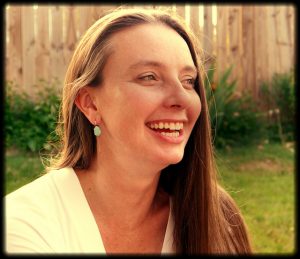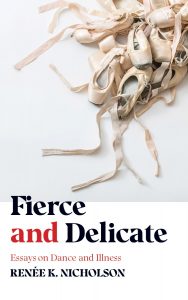My Body, My Book
 When I first put pen to paper, creating the early draft of my essay, “Five Positions,” the aim at that time was not a book. All I wanted to accomplish with the writing was to capture a bit of my past dancing self, one that was physically disappearing, a bit more with each passing year. So much of a dancer’s sense of identity can be found through her instrument, her body, and I was no exception.
When I first put pen to paper, creating the early draft of my essay, “Five Positions,” the aim at that time was not a book. All I wanted to accomplish with the writing was to capture a bit of my past dancing self, one that was physically disappearing, a bit more with each passing year. So much of a dancer’s sense of identity can be found through her instrument, her body, and I was no exception.
At the time I wrote the essay, my physical form had slipped into a frailer version, no longer a dancer, I had morphed into a chronic disease patient. Though I liked the physical contact of my pen on paper, even that sometimes aggravated my rheumatoid arthritis.
At that time, I did not realize Fierce and Delicate would be a kind of history, one truly embodied. I often wonder if I can truly know what a book is about until it’s finished, until hindsight gives me clarity I would not otherwise experience.
What I learned writing Fierce and Delicate is that the history of a body unspools across a continuum. As each individual essay came into shape, I moved along this continuum, remembering various versions of my body, each one a different place along a trajectory from my earliest days of dance training to living in a body as it experienced rapid decline to gaining back some (but not all) of what I had lost.
This history did not unfold in a linear way. Still, I trained my mind to remember earlier versions of my body, those steeped in the demand of learning the vernacular of classical movement, training the raw material—my own muscles—to be tamed by ballet’s rigors. My new set of demands was not dissimilar: conjure up the right words to capture what I once knew in the tissue and fiber of a past body.
Everyone lives in a body, particular to the one who inhabits it. We know this. And each of us finds ourselves physically able and unable to do things in our physical state. Our experience gives us a particular way of being in the world, which influences how we translate our physical being for others. For me, writing went from remembering the past body to harnessing the chaos of disease, even as that disease dismantled the discipline imposed by my younger self on my own form. Anyone who has felt the slippage of one self into another, that’s to say, anyone who has aged, whose body has been altered by time and experience can, I think, relate to my book on this essential level.
Reading and writing are processes of discovery, and in writing about my physical self, I came to uneasy terms with how my body had changed. I can lament my all-too-early total knee replacement while simultaneously celebrating what that surgery allows me to do. I hold complex and parallel feelings about my physical self, searching for words that might express both in tandem. Sometimes they find themselves, a swollen knee described as though a halved grapefruit had been slipped under my patella.
I can also look back on my dancing self with a sense of déjà vu, both remembering those bits of flying I once felt, even as my body is firmly anchored á terre. I’m filled with awe when I see in my mind’s eye that dancer I once got to be.
It’s such a peculiar thing to have never felt satisfied with my younger dancer self until she no longer existed. Now that wonderous creature visits my dreams, and I love her as only my non-dancing self can, totally and without reservation. My duty to both my current and past selves looms over the page as I compose and revise. The truth of my body reveals itself at each point along the continuum and in each gap between, the history of this body, a body given to me both by dance and by illness.
It’s apt that my parents named me Renée which, translated from French, means “reborn.” As I write the body, as any of us write our physical self, we enter a cycle of rebirth. The old self and the current self exist simultaneously, if only we have the courage to hold them both suspended in the moment as our pen slides across the page.
There were times writing this book when I stripped my body to its flesh, other times where the stiff, layered costumes became an exoskeleton, molding my form into a character for the stage. A walker became a temporarily extension of my body, shed as I devoted myself to the push of physical therapy as I had once devoted myself to pliés and tendus. In this way, there is a tacit connection between the old self and the evolving one. One version that gives way to the next, draft and revise.
When I wrote “Five Positions” I did not see the beginning of Fierce and Delicate. I wrote what felt alive and urgent. As it turned out, one essay wasn’t enough to capture the feeling. Essay-by-essay, I plotted my physical self along the continuum, and in charting this body, I found those sublime, liminal spaces beyond it. Ultimately, that’s the gift our physical self gives us as writers and as human beings, if we pay attention and, in the stillness, follow the wisdom of its movement.
—
Fierce and Delicate: Essays on Dance and Illness
 Renée Nicholson’s professional training in ballet had both moments of magnificence and moments of torment, from fittings of elaborate platter tutus to strange language barriers and unrealistic expectations of the body. In Fierce and Delicate, she looks back on the often confused and driven self she had been shaped into—always away from home, with friends who were also rivals, influenced by teachers in ways sometimes productive and at other times bordering on sadistic—and finds beauty in the small roles she performed. When, inevitably, Nicholson moved on from dancing, severed from her first love by illness, she discovered that she retained the lyricism and narrative of ballet itself as she negotiated life with rheumatoid arthritis.
Renée Nicholson’s professional training in ballet had both moments of magnificence and moments of torment, from fittings of elaborate platter tutus to strange language barriers and unrealistic expectations of the body. In Fierce and Delicate, she looks back on the often confused and driven self she had been shaped into—always away from home, with friends who were also rivals, influenced by teachers in ways sometimes productive and at other times bordering on sadistic—and finds beauty in the small roles she performed. When, inevitably, Nicholson moved on from dancing, severed from her first love by illness, she discovered that she retained the lyricism and narrative of ballet itself as she negotiated life with rheumatoid arthritis.
An intentionally fractured memoir-in-essays, Fierce and Delicate navigates the traditional geographies of South Florida, northern Michigan, New York City, Milwaukee, West Virginia, and also geographies of the body—long, supple limbs; knee replacements; remembered bodies and actual. It is a book about the world of professional dance and also about living with chronic disease, about being shattered yet realizing the power to assemble oneself again, in a new way.
Category: On Writing

























